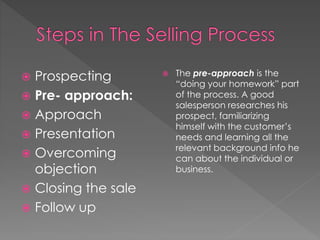A presentation on personal selling
- 2. Definition: ŌĆ£Oral presentation in a conversation with one or more prospective purchasers for the purpose of making salesŌĆØ ŌĆō American Marketing Association.
- 3. ’é× Relatively high level of customer attention ’é× Customize the message to a customerŌĆÖs specific interests and needs ’é× Two way communication gives immediate feedback ’é× Enables a salesperson to communicate a larger amount of technical and complex information than other promotional methods ’é× Greater opportunity to demonstrate a productŌĆÖs functioning and performance characteristics ’é× Helps to build a long term relationship
- 4. o Quantitative objectives: ŌĆó To get order and execute orders for customer satisfaction ŌĆó To meet sales target and profit and expense norms ŌĆó To maintain present and add new customers ŌĆó To achieve sales volume and satisfy coŌĆÖs product mix norms. ŌĆó To submit mgt reports regularly as per coŌĆÖs policies o Qualitative objectives: ŌĆó To do entire selling job ŌĆó To serve existing accounts ŌĆó To generate new enquires and new prospects ŌĆó To convert new prospects in long term customers ŌĆó To co-ordinate with distribution channel members ŌĆó To collect information
- 5. Prospecting Pre Approach Approach Presentation Overcoming Objection Closing the sale Follow up
- 6. ’é× Prospecting: ’é× Pre- approach ’é× Approach ’é× Presentation ’é× Overcoming objection ’é× Closing the sale ’é× Follow up ’é× Before planning a sale, a salesperson conducts research to identify the people or companies that might be interested in her product. ’é× A prospect is a lead that is qualified or determined to be ready, willing, and able to buy.
- 7. ’é× Prospecting ’é× Pre- approach: ’é× Approach ’é× Presentation ’é× Overcoming objection ’é× Closing the sale ’é× Follow up ’é× The pre-approach is the ŌĆ£doing your homeworkŌĆØ part of the process. A good salesperson researches his prospect, familiarizing himself with the customerŌĆÖs needs and learning all the relevant background info he can about the individual or business.
- 8. ’é× Prospecting ’é× Pre- approach ’é× Approach: ’é× Presentation ’é× Overcoming objection ’é× Closing the sale ’é× Follow up ’é× First impressions (e.g., the first few minutes of a sales call) are crucial to building the clientŌĆÖs trust.[ ’é× This usually involves introductions, making some small talk, asking a few warm-up questions, and generally explaining who you are and whom you represent. This is called the approach.
- 9. ’é× Prospecting ’é× Pre- approach ’é× Approach ’é× Presentation: ’é× Overcoming objection ’é× Closing the sale ’é× Follow up ’é× The presentation should be tailored to the customer, explaining how the product meets that person or companyŌĆÖs needs. ’é× It might involve a product demonstration, videos, PowerPoint presentations, or letting the customer actually look at or interact with the product.
- 10. ’é× Prospecting ’é× Pre- approach ’é× Approach ’é× Presentation ’é× Overcoming objection: ’é× Closing the sale ’é× Follow up ’é× After youŌĆÖve made your sales presentation, itŌĆÖs natural for your customer to have some hesitations or concerns called objections. Good salespeople look at objections as opportunities to further understand and respond to customersŌĆÖ needs
- 11. ’é× Prospecting ’é× Pre- approach ’é× Approach ’é× Presentation ’é× Overcoming objection ’é× Closing the sale: ’é× Follow up ’é× Eventually, if your customer is convinced your product will meet her needs, you close by agreeing on the terms of the sale and finishing up the transaction. ’é× Sometimes a salesperson has to make several trial closes during a sales call, addressing further objections before the customer is ready to buy.
- 12. ’é× Prospecting ’é× Pre- approach ’é× Approach ’é× Presentation ’é× Overcoming objection ’é× Closing the sale ’é× Follow up: ’é× The follow-up is an important part of assuring customer satisfaction, retaining customers and prospecting for new customers. ’é× This might mean sending a thank-you note, calling the customer to make sure a product was received in satisfactory condition, or checking in to make sure a service is meeting the customerŌĆÖs expectations
- 21. Need Solution Purchase Satisfaction
- 22. Need Product/Servi ce and trade name Purchase Satisfaction/D issatisfaction





























